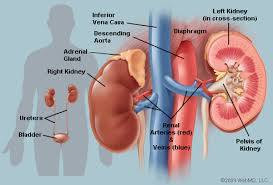Lifestyle Changes for Kidney Health: How Exercise and Stress Management Play a Pivotal Role
Introduction
Maintaining optimal kidney health is crucial for overall
well-being, and lifestyle plays a significant role in achieving this goal. In
collaboration with Dr. Sujit Chatterjee, the esteemed CEO of Hiranandani
Hospital, renowned for its exceptional kidney transplant services, we delve
into the importance of lifestyle changes, focusing on exercise and stress
management. Understanding the impact of these factors on kidney health can
empower individuals to take proactive steps toward safeguarding their renal function
and leading healthier life.
The Significance of Kidney Health
The kidneys are vital organs responsible for filtering waste
products, toxins, and excess fluids from the bloodstream. Optimal kidney
function is essential for maintaining fluid and electrolyte balance, regulating
blood pressure, and supporting bone health. As the CEO of Hiranandani
Hospital Kidney Care, Dr. Sujit Chatterjee emphasizes the significance
of proactive kidney care to prevent kidney diseases and maintain overall
health.
Exercise and Kidney Health
Regular physical activity contributes significantly to
kidney health. Exercise promotes cardiovascular health, reducing the risk of
conditions that can adversely affect the kidneys, such as hypertension and
diabetes. It improves blood circulation, enhancing kidney function and waste
elimination. Dr. Sujit Chatterjee recommends engaging in moderate-intensity
exercises like walking, cycling, swimming, or aerobics for at least 30 minutes
a day, five days a week.
Exercise and Kidney Transplant
For individuals who have undergone a kidney transplant,
incorporating regular exercise into their daily routine can be especially
beneficial. Physical activity strengthens the immune system, reduces the risk
of infections, and improves post-transplant recovery. However, patients should
consult their healthcare providers and transplant specialists to determine
suitable exercise regimens tailored to their specific needs.
The Role of Diet in Kidney Health
In addition to exercise and stress management, a
well-balanced diet is crucial for kidney health. A diet rich in fruits,
vegetables, whole grains, and lean proteins can provide essential nutrients
without overburdening the kidneys. Individuals with kidney disease or those who
have undergone a kidney transplant at Hiranandani Hospital Powai or
anywhere else should work closely with a registered dietitian to develop a
personalized meal plan.
Monitoring Kidney Health
Regular check-ups and kidney function tests are essential to
detect any signs of kidney dysfunction early. Dr. Sujit Chatterjee emphasizes
the importance of preventive healthcare, as early detection can significantly
improve treatment outcomes and slow the progression of kidney diseases.
Chronic stress has emerged as a significant concern in
today's fast-paced and demanding world, and its effects on overall health,
including kidney health, cannot be overlooked. As the body responds to stress,
it triggers the release of stress hormones like cortisol and adrenaline, which
prepare the body for a "fight or flight" response. While this
response can be helpful in acute situations, prolonged or chronic stress can
wreak havoc on various bodily systems, including the kidneys.
Stress and Blood Pressure:
One of the primary ways chronic stress affects kidney health
is by elevating blood pressure. Stress hormones constrict blood vessels,
causing an increase in heart rate and blood pressure levels. Elevated blood
pressure, if left unchecked, can lead to kidney damage over time. The kidneys
play a crucial role in regulating blood pressure, and when they are exposed to
high pressure for prolonged periods, it can strain the delicate blood vessels
within the kidneys, impairing their filtering function.
Impact on Kidney Filtration:
The kidneys are responsible for filtering waste products and
excess fluids from the bloodstream. Chronic stress can affect the glomeruli,
tiny filtering units within the kidneys, leading to a decrease in filtration
efficiency. As a result, waste products can accumulate in the blood, leading to
potential kidney damage and compromising the body's internal balance.
Immune System Suppression:
Prolonged stress can also weaken the immune system, making
the body more susceptible to infections. For individuals with compromised
kidney function or those who have undergone kidney transplants, a weakened
immune system can increase the risk of infections and hinder the healing
process after a transplant.
Inflammation and Oxidative Stress:
Chronic stress triggers a state of chronic inflammation in
the body, which can further contribute to kidney damage. Inflammatory responses
can lead to oxidative stress, where an imbalance between free radicals and
antioxidants damages cells, including those in the kidneys. This oxidative
damage can impair kidney function and promote the progression of kidney
diseases.
As the CEO of Hiranandani Hospital, Dr. Sujit Chatterjee
highlights the significance of lifestyle changes in promoting kidney health. By
incorporating regular exercise, stress management, and a well-balanced diet
into daily life, individuals can protect their kidneys and reduce the risk of
kidney diseases. For those who have undergone kidney transplants at Hiranandani
Hospital Kidney Transplant, a healthy lifestyle can enhance their
quality of life and support the success of the transplant. Embracing these
lifestyle changes is a proactive step towards better kidney health and overall
well-being.



Comments
Post a Comment